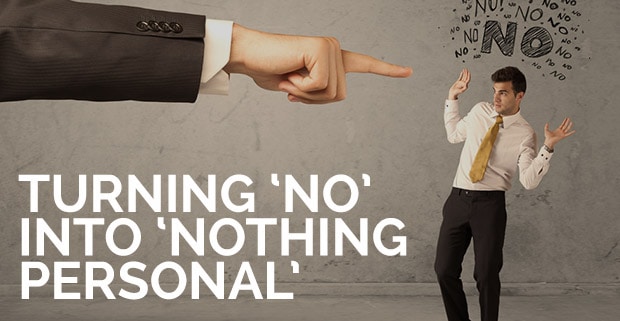 Image of employee feeling shamed by boss from Shutterstock.
Image of employee feeling shamed by boss from Shutterstock.
The working world is rife with rejection. From “we really like your work, but…” to flat out “no,” It can really keep you down. Author Victoria Carnaghan has tips on how to gracefully turn no into next time.
Whether you’re a graphic designer, copywriter, illustrator or other creative type lucky enough to produce your passion in exchange for a living wage, the delight of doing what you love comes with a downside: you have to put your heart on the line every time you present your work.
Unlike an accountant who’s submitted the wrong tax form, this was a piece of you, and you’re it’s being turned down. Rejected.
We creative types are passionate about our jobs and that’s what makes us good. And here’s how we can use that to our advantage when it feels like no one understands our vision.
Remember you’re being paid to be passionate
The creative industry is notorious for being hard on people’s feelings, says Susie Sykes, principal of Catapult Marketing, for five years she has been delivering quality marketing plans and products to her clients with the help of a high-calibre creative team.
Being passionate is a good thing, she says, because that’s what you’re being paid to do. If you’re designing a website for a bank, or writing ads for light bulb company, you’ve been brought in to do what these otherwise very talented people can’t: be creative.
“People want you to care about your work,” Susie says. “People often tell me I care as much as they do about their company. I’m passionate about my job and that’s why people hire us. They don’t want robots turning out average work. You have to put some emotion into it.”
Fight the good fight – but know your boundaries
Susie adds that it’s also a creative person’s job to fight for good design, writing, illustration – whatever it may be – as long as they know where to draw the line.
“You have to tell your client what looks good, what will resonate with audience – that’s what you’re there to do.” But sometimes, she says, you have to accept that your client has their own vision and no amount of convincing will change their minds. In those cases, she says, if you’ve tried your best, it’s OK to accept the feedback and give them what they want.
Be a grown-up about it
Maybe it’s not possible to become completely immune to negative feedback. But it is possible to deal with it like an adult. This distinction is crucial, my friend Carolyn Waye tells me.
As an experienced recruiter and career coach, Carolyn has placed hundreds of job-seekers into positions that fit their experience and personalities. At the same time, she’s had to turn down just as many unsuccessful candidates.
“I have had people swear at me, tell me I’m making the biggest mistake of my life by not hiring them,” she says, “the whole gamut of reactions.”
You’re allowed to be disappointed, you’re allowed to be sad, you’re allowed to cry. You are not allowed to post mean things about it on Facebook.”
But, in the recruiting business, it’s all about fit. The way someone reacts to rejection speaks volumes about their character, she says. If a candidate impresses her, she will remember his or her face. Even if they’re turned down for one role, they will be the first on her call list when she comes across a role that is right for them
“It would be great if more people could understand the other side of it. I remember those people – the people who were mature and gracious, who thanked me for my time and congratulated me on finding a good candidate.”
Create a secret coping trick
A classically trained singer and consistent presence on her hometown theatre scene, Carolyn is also a pro at handling artistic rejection. She says in art, as in life, if you burn your bridges, it’s hard to earn back that trust.
“Call your mom or call your best friend and let them know you are disappointed you didn’t get [a role]. You’re allowed to be disappointed, you’re allowed to be sad, you’re allowed to cry. You are not allowed to post mean things about it on Facebook.”
What I know from personal experience, and what I’ve learned by talking to these talented women is that, in a creative job, if it hurts, that probably means you’re doing it right. The magic, the true talent, is getting back up and realizing you didn’t lose anything by going through rejection, you only got one step closer to perfection.
Victoria is a Calgary-based freelance writer with 10 yeas of professional experience in journalism, corporate communications and copywriting. An avid plain language advocate and journalism graduate, Victoria is passionate about making information accessible to the world.
How do you handle rejection? What are some of your best (worst) rejection stories? We’d like to hear from you! Leave us a comment in the section below.